An accessibility project seven years in the making finally celebrated its completion earlier this month in Freeland.
With assistance from the Rotary Club of Whidbey Westside, volunteers from Island Beach Access recently rolled out 130 feet of woven mats at Robinson Beach. The accessible walkway links beachgoers to the water’s edge. Although they had to be put away for the fall and winter seasons, people in wheelchairs, with walkers, canes or crutches can enjoy traversing the mats starting next spring.
The seasonal mat placement at Robinson Beach is Island Beach Access’s newest successfully completed project. For the past 15 years, the nonprofit organization has been dedicated to identifying, enhancing and preserving beach access on Whidbey Island.
“We’re committed to protecting the public’s rights but also protecting the private owner’s rights,” said Mel Trenor, the organization’s president. “It’s kind of a fine line to walk sometimes.”
The group originally formed around a dispute along Wonn Road in Greenbank. After a lengthy legal battle, public access was secured in perpetuity for a portion of the area in question.
“That was the reason Island Beach Access was formed, to combat what we felt was an egregious violation of public property,” Trenor said. “Once that was resolved, there were lots of other areas on the island where the private and public interests collided, as it were.”
Over the years, the group became aware of a whole other issue – people with mobility challenges couldn’t even experience publicly accessible beaches.
In response, Island Beach Access launched an innovative project at Clinton Beach. By laying out a set of connecting bright blue mats made of durable, recycled plastic on the sand, those struggling with disabilities could also get to the water’s edge.
Trenor recalled witnessing an older couple using the mats with their wheelchair-bound son. Another man pulled his older dog down to the water in a cart.
“Even moms with strollers, people with wagons full of beach toys, it’s delightful to see them come down and go to the beach that way,” he said.
Trenor said the mats at Clinton Beach “worked beautifully” for three years, until an influx of driftwood rendered the beach inaccessible. The situation is complex and a solution has yet to be reached. In the meantime, from May to October, some of the mats are still installed near the parking lot.
The new universally accessible project at Robinson Beach has been stalled by the COVID-19 pandemic and permitting delays. At one point, Island Beach Access had to reapply for permits and a grant that the group had initially secured because they expired. The organization worked with several different government entities.
The finished result is 130 feet of mats, which measure five feet wide, and a 40-foot-long strip of paved parking area.
Factoring in the cost of permitting, paving and the mats, Trenor estimated the project’s price tag at about $15,000. The Rotary Club of Whidbey Westside covered paving costs, and $7,500 in donations from the community paid for the mats.
The new mats are a tan color, which Trenor hopes will be less of an eyesore to neighboring property owners in the Mutiny Bay area. They are permeable and virtually maintenance free.
Although the mats were put away for the season, they will return in May 2023. Trenor said his fantasy is that some devoted fishermen will be out in their wheelchairs casting their poles when the salmon are running.
“We just thought that the people who are (mobility) challenged did not have a voice,” he said. “That was part of our goal.”
There are a couple of other areas that Island Beach Access is considering for its next universal accessibility project. Trenor said there are a number of factors that need to be taken into account, such as tides, slope of the beach and driftwood accumulation. In addition, the group plans on partnering with the Whidbey Audubon Society to renovate a viewing platform on Crockett Lake.



